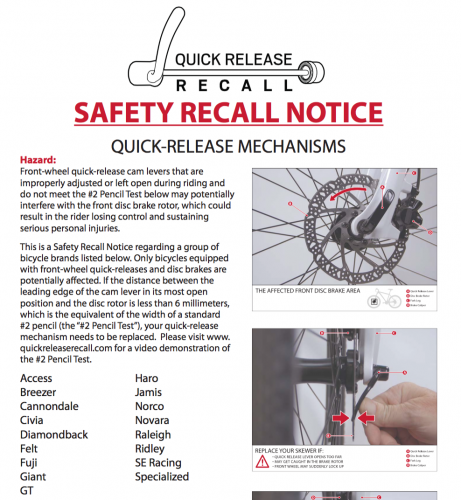BOULDER, Colo. (BRAIN) — Thirteen companies representing 17 bike brands are part of a joint voluntary recall of certain bikes equipped with front-wheel quick releases and disc brakes. The companies, through the Bicycle Product Suppliers Association, which acted as a mediator, are working with the U.S. Consumer Product Safety Commission, Health Canada and Profeco, the Mexican consumer protection federal agency, on the recall.
This is the largest group recall the industry has acted on, said Ray Keener, the BPSA's executive director.
The BPSA reached out to industry suppliers in late spring following the widespread awareness of a quick release lever issue earlier this year after Trek's recall of nearly 1 million bikes. That recall involved quick releases whose levers are left open or improperly adjusted while riding and can be caught in the front disc brake rotor when in the open position. This type of quick release is widely spec'd among bike suppliers.
"As this quick release issue became obvious, more companies became interested in doing a voluntary recall," said George Constantine, a lawyer from Venable LLP and counsel to the BPSA. "The BPSA was a natural next step to put a group together. We've been pleased to work cooperatively with the CPSC. They liked the idea of a large group coming together on this and working toward the greater goal of rider safety."
The companies included in the group recall are all BPSA members, though efforts were made to include all industry suppliers including non-BPSA members. Companies that are part of this recall are Accell North America (Raleigh, Diamondback), Advanced Sports International (Breezer, Fuji, SE), Cycling Sports Group (Cannondale, GT), Felt, G.Joanou Cycle Co. (Jamis), Giant Bicycle, Haro, LTP Sports Group (Norco), Performance Bicycle (Access), Quality Bicycle Products (Civia Cycles), Recreational Equipment Inc. (Novara), Ridley Bikes and Specialized Bicycle Components.
Specific models for each company weren't named in the recall notice, but bikes affected date back as far as 1998 for some brands. The bikes sold for between $200 and $10,000.
According to the CPSC recall notice, about 1.5 million bikes are affected. Three incidents were reported in which riders were injured as a result of an open quick release lever on the front wheel coming in contact with the front disc brake. One resulted in a broken finger, wrist injury, shoulder injury and abrasions; no injuries were reported in the other two incidents.
As part of the group recall, the BPSA has created a number of resources for consumers and retailers. A central website, quickreleaserecall.com, is now live. It addresses questions and directs consumers and retailers to appropriate resources. Among the resources is a video (below) that shows consumers how to check to see if their bike is among those affected.
Consumers are being told to check their bike and see if the quick release is part of the recall. They can do this by applying the #2 pencil test. This involves opening the lever and loosening the front-wheel quick-release cam, pushing the lever toward the brake disc rotor, and measuring the distance between the cam lever and the rotor. If the distance is more than a quarter of an inch (6 millimeters), the QR is not affected by this recall. This can be checked by sliding an ordinary #2 pencil between the cam lever and the rotor. If the pencil cannot easily fit between the lever and disc rotor, consumers must take their bikes to their local shop for a replacement QR.
Constantine said that companies participating in this group recall are shipping replacement QRs to retailers. Compensation for the labor is being handled differently by each company and retailers should refer to each company's individual website for more details about logging their recall activities, replacement QRs and disposing of affected QR mechanisms.
BPSA also has created QR Safety Recall posters (attached below) that it is mailing out to more than 5,000 retailers for posting in visible areas in their service departments until Jan. 31, 2016, along with a letter that explains the QR lever recall and where to go for more information.
BPSA's Keener said the marketing materials and informational posters, video and website were included in the overall cost for suppliers to be part of the group, and shared among all.
"It's very similar to what we do with the Owner's Manual," Keener said. "If individual companies did it on their own, they would be spending more money to make their own poster, video, etc. This is what the BPSA is all about — cooperation for the greater good."
Pat Cunnane, chair of the BPSA's committee addressing the matter, said, "Rider safety is our top priority."
"We are pleased to be able to serve a role in bringing together the participating companies and facilitating this unprecedented large group effort," he added.
Ridley Bikes' Richard Wittenberg said the company only had 18 bikes affected by this recall. "We're the smallest company that joined the group, but we're committed to cycling safety no matter what. And if there's one bike affected by this, we're doing it. It's not acceptable to have anything that can possibly hurt anybody out in the field," Wittenberg said.
Related BRAIN articles:
- Trek issues recall of QR on disc-brake bikes
- Shimano says Trek recall includes bikes equipped with its levers
- BPSA works with CPSC on QR issue
- Huffy recalling bikes because of possible QR/brake rotor problem
CPSC recall notice: cpsc.gov/en/Recalls/2015/Thirteen-Manufacturers-Distributors-Recall-Bicycles-with-Front-Disc-Brakes-to-Replace-Quick-Release-Lever.


